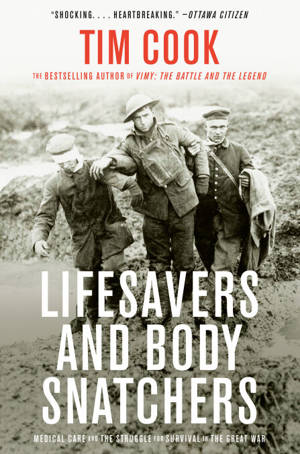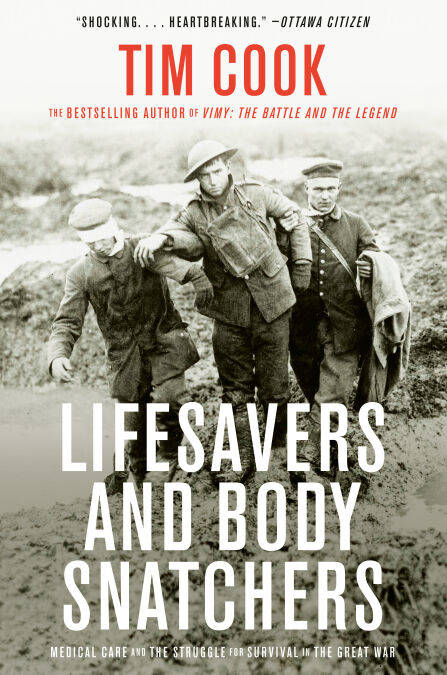
Bedankt voor het vertrouwen het afgelopen jaar! Om jou te bedanken bieden we GRATIS verzending (in België) aan op alles gedurende de hele maand januari.
- Afhalen na 1 uur in een winkel met voorraad
- In januari gratis thuislevering in België
- Ruim aanbod met 7 miljoen producten
Bedankt voor het vertrouwen het afgelopen jaar! Om jou te bedanken bieden we GRATIS verzending (in België) aan op alles gedurende de hele maand januari.
- Afhalen na 1 uur in een winkel met voorraad
- In januari gratis thuislevering in België
- Ruim aanbod met 7 miljoen producten
Zoeken
Lifesavers and Body Snatchers E-BOOK
Medical Care and the Struggle for Survival in the Great War
Tim Cook
E-book | Engels
€ 18,73
+ 18 punten
Omschrijving
*WINNER OF THE 2023 OTTAWA BOOK AWARD*
*SHORTLISTED FOR THE 2022 TEMPLER MEDAL FOR BEST BOOK*
From Canada’s top war historian, a definitive medical history of the Great War, illuminating how the carnage of modern battle gave birth to revolutionary life-saving innovations. It brings to light shocking revelations of the ways the brutality of combat and the necessity of agonizing battlefield decisions led to unimaginable strain for men and women of medicine who fought to save the lives of soldiers.
Medical care in almost all armies during the Great War, and especially in the Canadian medical services, was sophisticated and constantly evolving. Vastly more wounded soldiers were saved than lost. Doctors and surgeons prevented disease from decimating armies, confronted ghastly wounds from chemical weap-ons, remade shattered bodies, and struggled to ease soldiers’ battle-haunted minds. After the war, the hard lessons learned by doctors and nurses were brought back to Canada. A new Department of Health created guidelines in the aftermath of the 1918–1919 influ-enza pandemic, which had killed 55,000 Canadians and millions around the world. In a grim irony, the fight to improve civilian health was furthered by the most destructive war up to that point in human history.
But medical advances were not the only thing brought back from Europe: Lifesavers and Body Snatchers exposes the disturbing story of the harvesting of human body parts in medical units behind the lines. Tim Cook has spent over a decade investigating the history of Canadian medical doctors removing the body parts of slain soldiers and transporting their brains, lungs, bones, and other organs to the Royal College of Surgeons (RCS) in London, England. Almost 800 individual body parts were removed from the dead and sent to London, where they were stored, treated, and presented in exhibition galleries. After being exhibited there, the body parts were displayed in Canada. This uncovered history has never been told before and is part of the hidden legacy of the medical war.
Based on deep archival research and unpublished letters of soldiers and medical personnel, Lifesavers and Body Snatchers is a powerful narrative, told in Cook’s literary style, which reveals how the medical services supported the soldiers at the front and forged a profound legacy in shaping Canadian public health in the decades that followed.
*SHORTLISTED FOR THE 2022 TEMPLER MEDAL FOR BEST BOOK*
From Canada’s top war historian, a definitive medical history of the Great War, illuminating how the carnage of modern battle gave birth to revolutionary life-saving innovations. It brings to light shocking revelations of the ways the brutality of combat and the necessity of agonizing battlefield decisions led to unimaginable strain for men and women of medicine who fought to save the lives of soldiers.
Medical care in almost all armies during the Great War, and especially in the Canadian medical services, was sophisticated and constantly evolving. Vastly more wounded soldiers were saved than lost. Doctors and surgeons prevented disease from decimating armies, confronted ghastly wounds from chemical weap-ons, remade shattered bodies, and struggled to ease soldiers’ battle-haunted minds. After the war, the hard lessons learned by doctors and nurses were brought back to Canada. A new Department of Health created guidelines in the aftermath of the 1918–1919 influ-enza pandemic, which had killed 55,000 Canadians and millions around the world. In a grim irony, the fight to improve civilian health was furthered by the most destructive war up to that point in human history.
But medical advances were not the only thing brought back from Europe: Lifesavers and Body Snatchers exposes the disturbing story of the harvesting of human body parts in medical units behind the lines. Tim Cook has spent over a decade investigating the history of Canadian medical doctors removing the body parts of slain soldiers and transporting their brains, lungs, bones, and other organs to the Royal College of Surgeons (RCS) in London, England. Almost 800 individual body parts were removed from the dead and sent to London, where they were stored, treated, and presented in exhibition galleries. After being exhibited there, the body parts were displayed in Canada. This uncovered history has never been told before and is part of the hidden legacy of the medical war.
Based on deep archival research and unpublished letters of soldiers and medical personnel, Lifesavers and Body Snatchers is a powerful narrative, told in Cook’s literary style, which reveals how the medical services supported the soldiers at the front and forged a profound legacy in shaping Canadian public health in the decades that followed.
Specificaties
Betrokkenen
- Auteur(s):
- Uitgeverij:
Inhoud
- Aantal bladzijden:
- 416
- Taal:
- Engels
Eigenschappen
- Productcode (EAN):
- 9780735242326
- Verschijningsdatum:
- 12/09/2022
- Uitvoering:
- E-book
- Beveiligd met:
- Adobe DRM
- Formaat:
- ePub

Alleen bij Standaard Boekhandel
+ 18 punten op je klantenkaart van Standaard Boekhandel
Beoordelingen
We publiceren alleen reviews die voldoen aan de voorwaarden voor reviews. Bekijk onze voorwaarden voor reviews.









